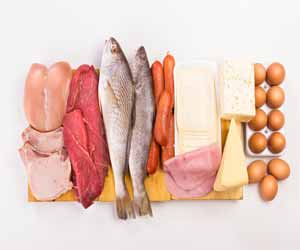- Home
- Editorial
- News
- Practice Guidelines
- Anesthesiology Guidelines
- Cancer Guidelines
- Cardiac Sciences Guidelines
- Critical Care Guidelines
- Dentistry Guidelines
- Dermatology Guidelines
- Diabetes and Endo Guidelines
- Diagnostics Guidelines
- ENT Guidelines
- Featured Practice Guidelines
- Gastroenterology Guidelines
- Geriatrics Guidelines
- Medicine Guidelines
- Nephrology Guidelines
- Neurosciences Guidelines
- Obs and Gynae Guidelines
- Ophthalmology Guidelines
- Orthopaedics Guidelines
- Paediatrics Guidelines
- Psychiatry Guidelines
- Pulmonology Guidelines
- Radiology Guidelines
- Surgery Guidelines
- Urology Guidelines
Consumption of Yogurt, cheese, and eggs may decrease risk of heart attack

DELHI: The consumption of red and processed meat increases the risk of ischemic heart disease (IHD), according to a recent study in the journal Circulation. The study further found that the consumption of yoghurt, cheese, and eggs, however, decreases the risk of Heart Attack and Ischemic Heart Disease.
There is uncertainty about the relevance of animal foods in causing ischemic heart disease. Timothy J. Key, Nuffield Department of Population Health, University of Oxford, Oxford, UK, and colleagues conducted this study to meat, fish, dairy products and eggs and risk for IHD in the pan-European EPIC cohort.
The researchers conducted a prospective study of 409,885 men and women in nine European countries. The diet was assessed using validated questionnaires, calibrated using 24-hour recalls. Lipids and blood pressure were measured in a subsample.
Also Read: Consumption of even small amounts of red meat may decrease lifespan
The authors found that:
- During 12.6 years mean follow up, 7198 participants had a myocardial infarction or died from IHD.
- The hazard ratio (HR) for IHD was 1.19 for a 100 g/d increment in intake of red and processed meat, and this remained significant after excluding the first 4 years of follow-up.
- Risk was inversely associated with intakes of yogurt (HR 0.93 per 100 g/d increment), cheese (HR 0.92 per 30 g/d increment) and eggs (HR 0.93 per 20 g/d increment); the associations with yogurt and eggs were attenuated and non-significant after excluding the first 4 years of follow-up.
- The risk was not significantly associated with intakes of poultry, fish or milk. In analyses modeling dietary substitutions, replacement of 100 kcal/d from red and processed meat with 100 kcal/d from fatty fish, yogurt, cheese or eggs was associated with approximately 20% lower risk of IHD.
- Consumption of red and processed meat was positively associated with serum non-HDL cholesterol concentration and systolic blood pressure, and consumption of cheese was inversely associated with serum non-HDL cholesterol.
Also Read: Consumption of yogurt, cheese may decrease risk of heart disease
"Findings revealed a positive association of IHD risk with the intake of red and processed meat. An inverse association of IHD risk with consumption of yogurt, cheese, and eggs was evident," write the authors.
They, however, noted that reverse causation bias may impact the links with yogurt and eggs. It was unclear whether the associations with red and processed meat and cheese were reflective of causality. However, they were consistent with the associations of these foods with plasma non-HDL cholesterol, and for red and processed meat with systolic blood pressure, which could mediate such effects.
For detailed study log on to https://doi.org/10.1161/CIRCULATIONAHA.118.038813

Disclaimer: This site is primarily intended for healthcare professionals. Any content/information on this website does not replace the advice of medical and/or health professionals and should not be construed as medical/diagnostic advice/endorsement or prescription. Use of this site is subject to our terms of use, privacy policy, advertisement policy. © 2020 Minerva Medical Treatment Pvt Ltd